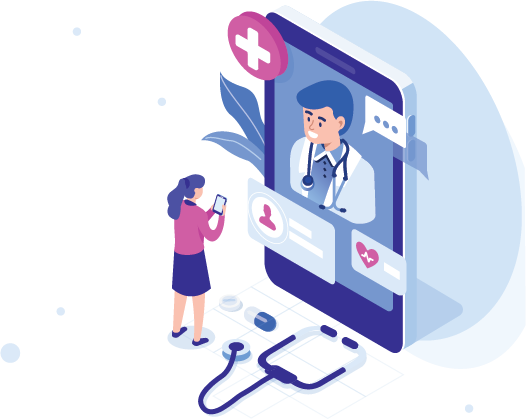We all know that the healthcare industry is plagued with allegations of patient data breaches from online hackers and in-house data imposters. Hackers constantly attempt to steal the Protected Health Information (PHI) of patients and sell it on the black market for fraudulent purposes. Patients’ PHI data is vulnerable because it is shared with various healthcare entities.
The Introduction of the Health Insurance Portability and Accountability Act (HIPAA), has transformed the way medical records and PHI is shared and used digitally.
This necessitates us to explore HIPAA in more detail.
What is HIPAA?
The federal HIPAA Act was introduced in 1996 to protect sensitive patient data. It provides data privacy and security provisions for safeguarding patients’ health information.
It gives an individual the rights to their health information, including the right to receive a copy of the information, ensure it is correct and understand who has seen or had access to it.
Any organization dealing with PHI must ensure that all the necessary physical, network, and process security measures are in place and are strictly followed.
The PHI consists of all individually identifiable health information of patients. This includes:
- Patient’s name, birth date, phone number, social security number (SSN), etc.
- Medical records and history, prescriptions, laboratory test reports, etc.
- Billing records and credit card details, etc.
- Insurance information and any other health information
Covered entities and their business associates need to protect all of this information under the HIPAA regulations.
The U.S. Department of Health and Human Services (HHS) has mandated HIPAA compliance from the following healthcare related organizations:
- Covered Entities: Any organization or individual providing treatment, payment or operations that directly handle PHI. This includes doctors, hospitals, healthcare clearinghouses, health plan providers, and any entity conducting certain financial and administrative transactions electronically.
- Business Associates: Any organization or individual providing support in treatment, payment or operations that handles or discloses PHI. A covered entity contracting with a business associate to perform healthcare related functions also fall under HIPAA regulations.
- Other Entities: Any healthcare contractor, subcontractor and related businesses accessing PHI should be HIPAA compliant.
The HIPAA Privacy & Security Rules
The HIPAA Privacy Rule administers the saving, accessing, sharing and maintaining of medical records and PHI of a patient.
The HIPAA Security Rule institutes national security standards for protecting patients’ health data created, received, maintained or transmitted electronically.
National Provider Identifiers (NPI)
HIPAA regulations include a standard unique health identifier for healthcare providers to simplify administrative processes, such as billing and referrals, to improve data accuracy, and reduce costs. All health care providers are eligible to be assigned NPIs. Healthcare providers who are covered entities must obtain and use NPIs.
Penalties Against HIPAA Violations
The HIPAA legislation levies heavy civil and criminal penalties for violation of HIPAA regulations. The severity of penalties varies depending on the type of data breach, the cause of leakage – whether intentional or unknowingly, and the frequency of data leakage from the same individual or office.
The Office for Civil Rights (OCR) can enforce civil penalties ranging from $100 per violation to $25,000 per calendar year. The Department of Justice can enforce criminal penalties up to 10 years of imprisonment and a $250,000 fine.
Importance of HIPAA for Patients
HIPAA regulations offer a multitude of benefits to patients:
- HIPAA ensures that HIPAA-covered entities and business associates implement multiple safeguards to protect sensitive personal and health information.
- Due to the advancement in the health information technology, patients can easily access their health information quicker, on-demand and in real-time.
- With easy access to their Electronic Health Records (EHRs), patients are empowered to be more in control of decisions regarding their health and well-being.
- Individuals can now take a more active role in their healthcare and obtain copies of their health information.
- Patients with access to their electronic health information are better able to monitor their chronic conditions and track progress in wellness or disease management programs.
- Patients can now protect themselves from identity theft by controlling who has access to their health data, restricting who can view their health information and who that information can be shared with.
- Any information disclosed to healthcare providers and health plans, or information that is created by them, transmitted, or stored by them, is subject to strict security controls.
- Patients can check their health records and have any incorrect information updated.
- Once the health record copies are obtained, patients can seek treatment from new healthcare providers by sharing their health information (without repeating lab tests or preliminary procedures) and get timely prognoses from the new healthcare providers.
- Individuals can rest assured that their information is protected from hackers and unauthorized access due to robust confidentiality.
Importance of HIPAA for Healthcare Organizations
HIPAA introduced a number of important benefits for the HIPAA compliant healthcare organizations. Some of them are:
- Due to the usage of the same code sets and nationally recognized identifiers in HIPAA, healthcare data transfer between healthcare entities became seamless and fast.
- HIPAA helped the transition from paper records to electronic copies of health information.
- Administrative healthcare functions have been streamlined.
- HIPAA improved efficiency in the healthcare industry.
- It ensured PHI is shared securely.
- Now, patients understand that their data is safe and secure. Patients become more willing to disclose pertinent medical details, and this sharing facilitates accurate diagnosis.
- Healthcare organizations know that HIPAA violations are a costly affair. So they take appropriate steps to ensure compliance, which is much easier and less expensive in comparison.
- Being HIPAA compliant helps in setting up secure processes, training employees, and keeping systems up-to-date to avoid security breaches.
- Being HIPAA compliant helps in gaining patient trust and increasing the brand identity and reputation of a practice.
HIPAA legislation is changing constantly to counter the data breach incidents. The healthcare industry also needs to show flexibility and adapt to the ever changing regulations for its own betterment and for its customers safety.
Description:
The HIPAA Act is very important regulation because it safeguards the patients’ health data and PHI. It has set clear security standards about safeguarding medical records. It levies strict penalties and fines for violating the HIPAA law.
References:
- https://www.hhs.gov/hipaa/index.html
- https://www.hhs.gov/hipaa/for-professionals/training/index.html
- https://www.hhs.gov/hipaa/for-professionals/faq/index.html
- https://www.hipaanswers.com/why-is-hipaa-important-to-patients/
- https://securenetmd.com/hipaamatters/top-3-reasons-hippa-important-patients/
- https://securenetmd.com/hipaamatters/hipaa-compliance-important-healthcare-providers/



